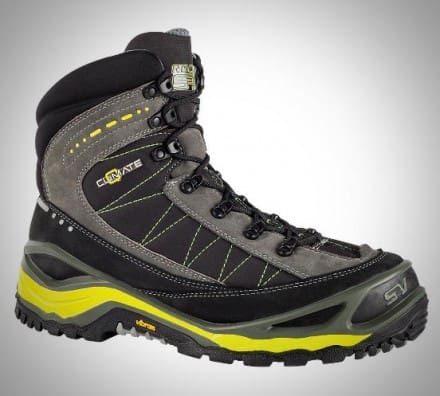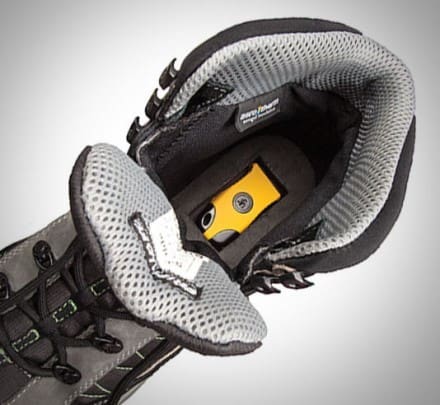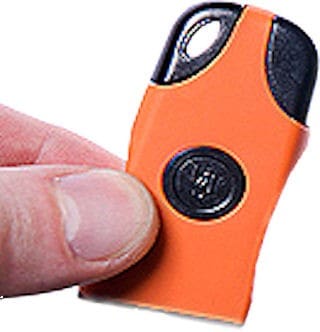Yeah, I know. It sounds crazy doesn’t it? Well, it’s not crazy of you have a pair of new Rocky S2V Substratum Direct Attach Hikers.
To make a fire, just remove your boot and pull out the foot-bed. In a recess beneath the footbed rests a firesparker and wetcubes from Ultimate Survival Technologies. .
The Sparkie is a one-handed emergency fire starter that weighs less than one ounce. It also comes packaged with two WetFire tinder cubes.
But these aren’t just a vessel for a cool firestarter. Unveiled at Summer OR, Rocky offers an upper made from nubuck leather and ripstop nylon with a polyurethane rand wrapped around the toe and heel. They’ve also included 550 cord laces for additional survival applications.
The Substratum Direct Attach Hiker also features a moisture-wicking lining and Hydro IQ (waterproof/air circulation). Additionally, it is insulated with Aerotherm® Aerogel insulation and PrimaLoft® insulation in targeted sections of the boot. Here’s another cool survival component. The antimicrobial insole has been made in a bright, fuchsia color; not only will it suppress odors and cushion your feet, but can also be used to signal for help.
Tags: Rocky S2V





This is an interesting idea, but the execution isn’t terribly confidence inspiring.
Keeping survival equipment, essentially, on-person rather than in a pouch or a bag is a good idea. Bags and even mounted pouches get dropped, separated from wearers in falls or other events, left behind in a panic, or removed by aggressors. Stuff secreted with thought and care around the body is quickly at hand, even if primary load-carriage is damaged, and may be overlooked in cursory searches if that is a concern. So, on that front, this is great, if a bit gimmicky.
The choice of tools, however, leaves some to be desired. We’ve been testing various tinder materials and sparker products in an ongoing multi-year evaluation since 2008, and have used several Sparkie’s and probably a pound of WetFire along the way. The Sparkie may be the best of UST’s fire-starters – We’ve broken both StrikeForce and BlastMatch units, both of which are are extremely bulky, but all our Sparkie’s are still functional for their main purpose (some plastic damage, but they all still work). That said, it is still a slightly fragile design. If the storage compartment compresses at all under a users weight, distributing that force to the Sparkie, expect to see it damaged by the time a user pulls it out during a survival situation. Damaged beyond usability? Hard to say. All I can say is that, when broken apart, the integral striker in the Sparkie does prove a bit harder to use conventionally (striker in one hand, ferrocerium “flint” in the other) than purpose made designs.
Also at issue, WetFire Tinder has a very definite shelf-life. Even the manufacturer lists a shelf-life on packaging. Inside packaging, in an air-tight container that receives very little motion or jostling, our experience has been that it’s only reliable for 6-months (with occasional useability out to 1 year). In an airtight, but regularly carried container, 6 months is the extent of its usability. Samples at 1 year of regular carry, had broken down physically, and performed extremely poorly if they lit at all. And that is if the packaging remains airtight. Once exposed to air, from either opening the package or from small holes wearing into the package, a cube of WetFire is good for, at the outside, 15 days. Beyond that, they are inconsistent and unreliable. Carried inside a boot, it is reasonable to expect the package of WetFire to experience at least some wear, that could puncture the packaging. Also, the cube may experience pressure, as well as jostling and impact, causing the material to breakdown into smaller and smaller crumbles which seems to also negatively impact performance, and further shorten the lifespan.
Other tinder-materials would be far more ideal for this: SOLKOA/Fast-Fire’s FastFire cubes have both tougher packaging, and seem to last (at least) a couple of years when stored air-tight. Outside the package, they do degrade, but much much slower, on the order of months rather than days. Also, Four Seasons Survival’s Tinder-Quik tabs, which are smaller as well, can be stored for decades (our oldest samples are pushing 30 years) exposed to air, with zero degradation or decrease of performance in our testing. Tinder-Quik are also much more durable, and do not break down from jostling, pressure, etc. in kits or, at an educated guess, tucked away in a boot.
This is a neat idea. It’d be an actual good idea if a simpler sparker design, such as a straight ferrocerium rod and striker combo, and more storable, durable, tinder material were used.
Morgan, huge thanks for the review on firestarters, and ‘WetFire’ in particular. To me tinder with this limited shelf-life and durability to mechanical wear when packed is *seriously*worse*than*nothing*. Actually, I’m now pretty much pissed at UST. It’s not often that I miss a big red warning text, but now I do.
I just wonder how pissed I would have been had I had to resort to the fancy expensive tinder when badly needing a fire in the wilderness in the Arctic winter. Resinous wood, birch bark, dry spruce twigs and, in a pinch, stearine soaked cardboard cubes is what I tend to use. I packed the “ultimate survival” tinder away for the real thing after limited initial testing. Huh.
Heck, there it sits packed in my survival kit(s). Lesson learnt: Don’t be cheap & lazy, do test and train to use your survival kits regularily, and do test *all* the items. I’ll test my years-old wetfire tinder asap.
That said, the idea of tinder in the shoe bottom seems gimmicky, but the real issue is whether the boots are as bad as Morgan tells us the tinder inside them is!
Thanks again!
gimmicky at best.
you couldn’t pay me to walk on that all day. I would be shocked if you can’t feel that no matter how well they recessed it into the midsole.